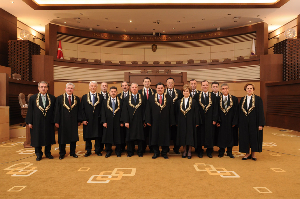Babahan: The fight inside the military
Ergun Babahan in Özgür Düşünce writes that it is becoming increasingly clear that the Palace wants to have a big purge in the ranks of the military. It is equally clear that the general staff is resisting this. The pro-palace media provoked a reaction from the general staff by its recent stories claiming that “Gülenist officers in the armed forces are going to carry out a coup.” The General staff denied these allegations in a forceful language, stating that “no one can take action outside the chain of command.” This stance amounted to checking the demands for a purge. In fact, the fight is not really about the issue of the Gülenists, but about the relations to the United States and NATO. This is not an exclusive AKP operation, but a plan that is being implemented jointly with the neo-nationalists, the ulusalcı. The ulusalcı are attempting to regain the positions within the armed forces that they lost with the Ergenekon and Sledgehammer cases. The aim is to purge the cadres that have been on NATO duty in Brussels and Pentagon, and that are deemed to be close to the Western culture. Thus, it is not a question of purging Gülenists; what is taking place is a fight between the pro-NATO and ulusalcı cadres of the military. If the latter prevail, the command chain of the armed forces for years to come will be refashioned in accordance with the wishes of the ulusalcı. We are witnessing a fight that is going to determine Turkey’s place in the world.
Belge: Erdoğan the new hero of Kemalists?
Murat Belge in Birikim writes that the reigning mentality in Turkey is that tension is the best ally of rulers. Tayyip Erdoğan saw that declaring war on the Kurds would give him back what he had lost, and he made those who called for stern measures against the Kurds happy. Tayyip Erdoğan had also decided to make peace with the neo-nationalists with whom he had been jarring until recently. After the parting of ways with the Gülenists, there is a potential to make peace with the Kemalists, or at least with some of them. When the Kurds are struck, some of the nationalists who hate the AKP can’t help but to be happy about it and they start thinking that the AKP may have some “positive” sides. Can these circles forget, let alone pardon, all those “Sledgehammers” and “Ergenekons?” I don’t think so. But this is the world of politics. It may be necessary to store away some problems for a while; and then, when you have become sufficiently strong, you think that you will extract them again. For the time being, this is the prevailing mood among those circles. So, can we thus conclude that Tayyip Erdoğan has gotten his “rose garden without thorns?” Well, history has never seen any such “rose garden.” What a look at the facts tells us is that these policies of tension and quarrel that Tayyip Erdoğan has made so much use of have confined him to a terrain that is becoming increasingly narrow.
The Balyoz Retrial and the Changing Politics of Turkish Justice
By Gareth Jenkins (vol. 7, no. 12 of the Turkey Analyst)
On June 18, 2014, the Turkish Constitutional Court ordered a retrial in the infamous Balyoz, or “Sledgehammer”, case in which 237 serving and retired military personnel were convicted of plotting to stage a coup to overthrow the government of the Justice and Development Party (AKP). The retrial appears likely to result in the acquittal of the accused. However, the timing of the Constitutional Court’s decision has done little to allay concerns about the politicization of the Turkish judicial system.

What the Sledgehammer Sentences Mean
By Halil M. Karaveli (vol. 5, no. 18 of the Turkey Analyst)
The sentences in the Sledgehammer trial demonstrate the subjugation of the military to civilian, democratic, legal authority. But at the same time, it is not in the interest of the government of the Justice and Development Party (AKP) that the officer corps is further demoralized. Prime Minister Recep Tayyip Erdoğan no longer has an interest in wielding a sledgehammer against the military. The outcome of the trial of the generals must be viewed against the backdrop of the new power struggle that rages in Turkey, between the AKP and the movement of Fethullah Gülen.
The Changing Objects of Fear: The Arrest of Ilker Basbug
By Gareth H. Jenkins (vol. 5, no. 1 of the Turkey Analyst)
In the early hours of January 6, 2012, General İlker Başbuğ, who served as chief of the Turkish General Staff from 2008 to 2010, was arrested and imprisoned on allegations of “founding or directing an armed terrorist organization” and “inciting the overthrow of the government of the Turkish Republic or the prevention of it fulfilling its duties”. For many, the arrest of Başbuğ on terrorist charges will be regarded not so much as demonstrating that the General staff is no longer untouchable but that the Fethullah Gülen Movement has the power to imprison whoever it likes.



